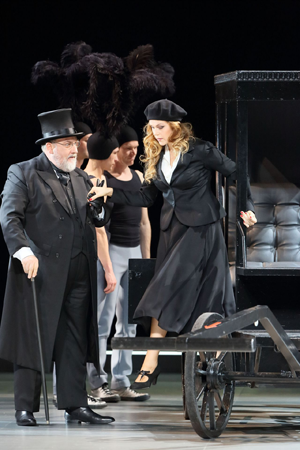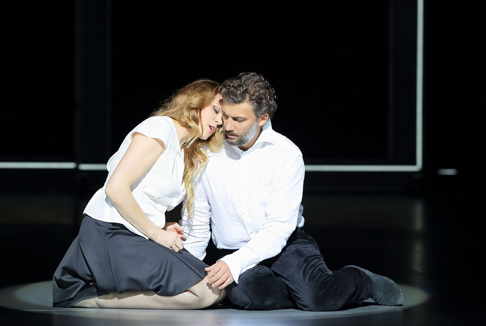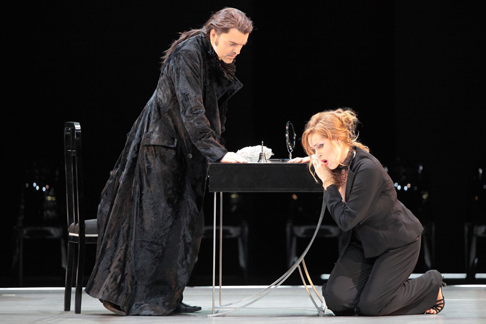![Kristine Opolais as Manon Lescaut and Jonas Kaufmann as Il Cavaliere Renato des Grieux [Photo courtesy of Bayerische Staatsoper]](http://www.operatoday.com/csm_FG_Manon_Lescaut_15_ff46ff85ad.png)
01 Aug 2015
Manon Lescaut, Munich
Puccini’s Manon Lescaut at the Bayerische Staatsoper, Munich. Some will scream in rage but in its austerity it reaches to the heart of the opera.
English Touring Opera are delighted to announce a season of lyric monodramas to tour nationally from October to December. The season features music for solo singer and piano by Argento, Britten, Tippett and Shostakovich with a bold and inventive approach to making opera during social distancing.
This tenth of ten Live from London concerts was in fact a recorded live performance from California. It was no less enjoyable for that, and it was also uplifting to learn that this wasn’t in fact the ‘last’ LfL event that we will be able to enjoy, courtesy of VOCES8 and their fellow vocal ensembles (more below …).
Ever since Wigmore Hall announced their superb series of autumn concerts, all streamed live and available free of charge, I’d been looking forward to this song recital by Ian Bostridge and Imogen Cooper.
The Sixteen continues its exploration of Henry Purcell’s Welcome Songs for Charles II. As with Robert King’s pioneering Purcell series begun over thirty years ago for Hyperion, Harry Christophers is recording two Welcome Songs per disc.
Although Stile Antico’s programme article for their Live from London recital introduced their selection from the many treasures of the English Renaissance in the context of the theological debates and upheavals of the Tudor and Elizabethan years, their performance was more evocative of private chamber music than of public liturgy.
In February this year, Albanian soprano Ermonela Jaho made a highly lauded debut recital at Wigmore Hall - a concert which both celebrated Opera Rara’s 50th anniversary and honoured the career of the Italian soprano Rosina Storchio (1872-1945), the star of verismo who created the title roles in Leoncavallo’s La bohème and Zazà, Mascagni’s Lodoletta and Puccini’s Madama Butterfly.
Evidently, face masks don’t stifle appreciative “Bravo!”s. And, reducing audience numbers doesn’t lower the volume of such acclamations. For, the audience at Wigmore Hall gave soprano Elizabeth Llewellyn and pianist Simon Lepper a greatly deserved warm reception and hearty response following this lunchtime recital of late-Romantic song.
Collapsology. Or, perhaps we should use the French word ‘Collapsologie’ because this is a transdisciplinary idea pretty much advocated by a series of French theorists - and apparently, mostly French theorists. It in essence focuses on the imminent collapse of modern society and all its layers - a series of escalating crises on a global scale: environmental, economic, geopolitical, governmental; the list is extensive.
For this week’s Live from London vocal recital we moved from the home of VOCES8, St Anne and St Agnes in the City of London, to Kings Place, where The Sixteen - who have been associate artists at the venue for some time - presented a programme of music and words bound together by the theme of ‘reflection’.
'Such is your divine Disposation that both you excellently understand, and royally entertaine the Exercise of Musicke.’
Amongst an avalanche of new Mahler recordings appearing at the moment (Das Lied von der Erde seems to be the most favoured, with three) this 1991 Mahler Second from the 2nd Kassel MahlerFest is one of the more interesting releases.
‘And there was war in heaven: Michael and his angels fought against the dragon; and the dragon fought and his angels, And prevailed not; neither was their place found any more in heaven … that old serpent … Satan, which deceiveth the whole world: he was cast out into the earth, and his angels were cast out with him.’
If there is one myth, it seems believed by some people today, that probably needs shattering it is that post-war recordings or performances of Wagner operas were always of exceptional quality. This 1949 Hamburg Tristan und Isolde is one of those recordings - though quite who is to blame for its many problems takes quite some unearthing.
There was never any doubt that the fifth of the twelve Met Stars Live in Concert broadcasts was going to be a palpably intense and vivid event, as well as a musically stunning and theatrically enervating experience.
‘Love’ was the theme for this Live from London performance by Apollo5. Given the complexity and diversity of that human emotion, and Apollo5’s reputation for versatility and diverse repertoire, ranging from Renaissance choral music to jazz, from contemporary classical works to popular song, it was no surprise that their programme spanned 500 years and several musical styles.
The Academy of St Martin in the Fields have titled their autumn series of eight concerts - which are taking place at 5pm and 7.30pm on two Saturdays each month at their home venue in Trafalgar Square, and being filmed for streaming the following Thursday - ‘re:connect’.
The London Symphony Orchestra opened their Autumn 2020 season with a homage to Oliver Knussen, who died at the age of 66 in July 2018. The programme traced a national musical lineage through the twentieth century, from Britten to Knussen, on to Mark-Anthony Turnage, and entwining the LSO and Rattle too.
With the Live from London digital vocal festival entering the second half of the series, the festival’s host, VOCES8, returned to their home at St Annes and St Agnes in the City of London to present a sequence of ‘Choral Dances’ - vocal music inspired by dance, embracing diverse genres from the Renaissance madrigal to swing jazz.
Just a few unison string wriggles from the opening of Mozart’s overture to Le nozze di Figaro are enough to make any opera-lover perch on the edge of their seat, in excited anticipation of the drama in music to come, so there could be no other curtain-raiser for this Gala Concert at the Royal Opera House, the latest instalment from ‘their House’ to ‘our houses’.
"Before the ending of the day, creator of all things, we pray that, with your accustomed mercy, you may watch over us."
![Kristine Opolais as Manon Lescaut and Jonas Kaufmann as Il Cavaliere Renato des Grieux [Photo courtesy of Bayerische Staatsoper]](http://www.operatoday.com/csm_FG_Manon_Lescaut_15_ff46ff85ad.png)
Puccini’s Manon Lescaut at the Bayerische Staatsoper, Munich. Some will scream in rage but in its austerity it reaches to the heart of the opera.
What is Manon Lescaut really about? The Abbé Prévost’s 1731 narrative was a moral discourse. Unlike many modern novels, it wasn’t a potboiler but a philosophical tract in which the protagonists face moral dilemmas.
In this production, key excerpts from Prévost are shown at critical points, not just during the Intermezzo. These are important because they underline the origin of the opera, and its deepest values. The staging is black and white, lit like an interrogation room, for such is its fundamental rationale. It’s not a potboiler, not sentimental. but an uncompromising warning against the seduction by false values like wealth, glitz and short term shallowness. It says much about some audiences that they’d prefer things the other way round.
 Roland Bracht as Geronte di Ravoir and Kristine Opolais as Manon Lescaut
Roland Bracht as Geronte di Ravoir and Kristine Opolais as Manon Lescaut
Hans Neuenfels’s production, with designs by Stefan Meyer, captures the spiritual state of flux that is so much part of Puccini’s opera. The action moves from place to place but the underlying theme is bleak. The journey starts at Amiens, a faceless place where everyone’s en route to somewhere else. One characteristic of Neuenfels’s style is the way he uses crowds. In his Lohengrin for Bayreuth (read more here), the people of Brabant were shown as rats, since rats conform, but Neunfels treated them not as vermin but with sympathy and warmth. In Manon Lescaut, the townsfolk have garish makeup suggesting Georg Grosz-like malevolence beneath their well-padded uniforms. Anonymous figures appear, zipped up in body bags. Not “belle, brune et blonde” but dehumanized creatures, being trafficked, presumably to America. Suddenly, the casual, flirtatious bantering feels dangerous.
Neunfels’s use of crowds also serves to highlight the central characters. Des Grieux (Jonas Kaufmann), Manon (Kristine Opolais) and Lescaut (Marcus Eiche) stand out in sharp black and white, in full focus. This is luxury casting, and so they should shine. Kaufmann and Opolais “own” these roles these days If anything, they were singing with even greater intensity than they did at the Royal Opera House production last year. Kaufmann’s portrayal was exceptionally deep, enhanced by Neuenfels’s emphasis on the moral and philosophical basis of Des Grieux’s dilemmas, which are inherently dramatic in themselves.
 Kristine Opolais as Manon Lescaut and Jonas Kaufmann as Il Cavaliere Renato des Grieux
Kristine Opolais as Manon Lescaut and Jonas Kaufmann as Il Cavaliere Renato des Grieux
In most productions, Manon’s beauty steals the show. When Anna Netrebko pulled out of the part, many sighed with relief, since Opolais has the artistic courage not to need to be seen at her finest. When she sings, she creates a real Manon with all her insecurities and complexities. She dares depict Manon’s inner ugliness, because she can also show her true beauty. Opolais may look tense in the first act and ravaged in the last, but that’s all the more reason to admire her integrity. As she lies on the hard, bare stage that depicts the spiritual desert that is New Orleans, (where physical deserts don’t exist), with her face gaunt and the dark roots in her hair showing, Opolais’s voice transcends her surroundings. Manon is a true hero because she changes, develops and learns true meaning.
The staging of the Paris Act makes or breaks any production, since it confronts the obscenity of Manon’s situation as, frankly, a one-man prostitute. The stage shrinks, lit by a frame of light suggesting a prison without bars, with cut glass objets de luxe symbolizing hard but fragile transparency. All is delusion, the makeup, the madrigals, the dancing. Geronte (Roland Bracht) fancies himself an artist. His friends and Abbé’s aren’t fooled. They’ve come to perve at Manon’s body. In London, many in the audience were aghast that the scene was shown as live porm, but that’s exactly what it is, a rich man showing off to dirty old men like himself. It’s not meant to be pretty, as any reading of Puccini’s score makes clear.
 Markus Eiche as Lescaut and Kristine Opolais as Manon Lescaut
Markus Eiche as Lescaut and Kristine Opolais as Manon Lescaut
Neuenfels shows Geronte kissing Manon’s naked leg. The Dancing Master is depicted as an ape, which adds even more horror. Yet Neuenfels also shows that the Dancing Master and Manon have much in common, both reduced to performing animals by the corruption of wealth. Geronte’s friends and, signifcantly, Abbés, supposedly celibate holy men, are dressed as cardinals in fuschia pink. This is not casual detail, for it connects to the brutality of a society that reveres woman as virgins, but objectifies them as sexual creatures to be abused and disposed of.
At Le Havre, Manon is seen in anonymous grey. The gloating crowd with their red wigs now seem demonic,as they are indeed, since they’ve come to enjoy seeing the degradation of women as prisoners. In contrast, the Sergeant seems more human, since he lets Des Grieux slip aboard, no doubt breaking rules. By the time we reach the all-impotant final act, all external trappings are disposed of, too. Manon and Des Grieux are alone, in almost cosmic isolation. All distractions stripped away, Kaufmann and Opolais can release emotions through the sheer power of their singing. Divested of material things they transcend the world itself.
Superlative conducting from Alain Altinoglu, too, leaner than Pappano, but more suited to this elegant, austere conception. Of the three Manon Lescauts in the last two years London, Baden Baden and Munich, this new production is by far the most incisive and intelligent. Good opera goes far beyond the first line in a synopsis. As Manon learns, life isn’t about glitzy trappings, but about human emotion.
Anne Ozorio